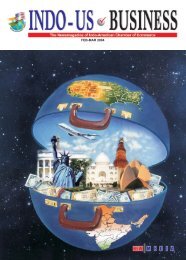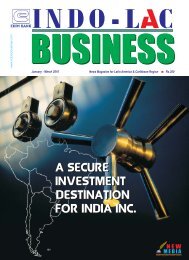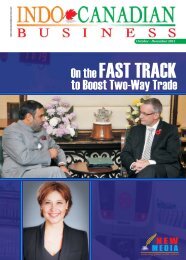Full page fax print - Indo-American Chamber Of Commerce
Full page fax print - Indo-American Chamber Of Commerce
Full page fax print - Indo-American Chamber Of Commerce
You also want an ePaper? Increase the reach of your titles
YUMPU automatically turns print PDFs into web optimized ePapers that Google loves.
Face-To-Face<br />
Suresh Kumar has been nominated by President Barack Obama<br />
and unanimously confirmed by the United States Senate to serve<br />
as Assistant Secretary of <strong>Commerce</strong> and Director General for<br />
the U.S. & Foreign Commercial Service at the U.S. Department<br />
of <strong>Commerce</strong>. As Assistant Secretary and Director General,<br />
Kumar leads the US & Foreign Commercial Service (USFCS).<br />
The extensive worldwide network of the USFCS extends to 109<br />
offices across the US and 127 offices overseas in 77 countries.<br />
USFCS is the trade promotion arm of the US Government that<br />
supports and provides customized solutions to US businesses so<br />
that they can compete and win in the global marketplace.<br />
Suresh Kumar, Assistant Secretary for Trade<br />
Promotion and Director General of the U.S. & Foreign<br />
Commercial Service U.S. Department of <strong>Commerce</strong><br />
International Trade Administration<br />
Prior to his joining the Obama administration, Kumar spent<br />
more than 30 years as an international businessman,<br />
consultant, coach and professor of management education. He<br />
has led global businesses of major US corporations and been<br />
responsible for business units across all continents. Between<br />
1999 and 2003 Kumar headed the Worldwide Consumer<br />
Pharmaceuticals business of Johnson & Johnson and served on<br />
the corporation's Group Operating Committee. He is credited<br />
with turning around the Emerging Markets Business,<br />
establishing collaborations, developing and commercializing<br />
innovation pipeline, and building stakeholder trust in the<br />
teaching should we adopt to make the education relevant<br />
to the emerging needs of the country. In India there has<br />
been a spurt in the number of schools of management<br />
studies but there is a gap when it comes to teaching.<br />
There aren't enough teachers. Most professionals I know<br />
are teaching at business schools on weekends and they<br />
are, in a sense, giving back to the profession and the<br />
community what they have learned from experience.<br />
Let us consider the sectors of growth in India. Let us look<br />
at Energy. We need more engineers. I can remember a<br />
time when every student wanted to do engineering and<br />
the colleges produced a glut of students with engineering<br />
degrees. We have come a full circle since then and we<br />
need them now but the students are doing something<br />
else.<br />
different levels in terms of qualified work force and we set<br />
out to make the education relevant to those needs.<br />
In terms of jobs I can see there are jobs but not the<br />
required skills. We are training the students for the wrong<br />
skills. Students are better served to look at the needs here<br />
as opposed to going abroad, I would say. When you join<br />
a multinational you become a part of a global work force.<br />
You can join here and perform well and that will take you<br />
abroad. That's been the pattern of evolution of the job<br />
market. Industrialists keep talking about a skill gap but<br />
the point that's not seen is that there is a need to train their<br />
employees. We do that in the US.<br />
You have already executed three successful trade<br />
missions in the energy efficiency sector. Is the<br />
energy sector a special focus area in the <strong>Indo</strong>-US<br />
We have to craft the education in institutes to meet the trade relationship?<br />
demand for manpower in the growth sectors of the<br />
Yes, it is a very special mission. It is important in the light<br />
present and the future, say 20-30 years from now.<br />
of India's plans to invest significantly in the sector by 2030<br />
If we look at healthcare, the need is not only in Mumbai, it and India has the national solar plan which will install<br />
is in the villages. We need doctors and para-medical 20,000 megawatts of solar power by 2020. I recently led<br />
staff. There are different levels of education involved here a team which had about 203 people from the private<br />
and we have to see which are the most urgently needed. sector exploring opportunities within India under<br />
The important aspect of all that we are discussing is the government schemes and beyond. There was Rajasthan<br />
need to define what each growing sector requires at and Gujarat for solar energy and the Southern States for<br />
INDO-US BUSINESS SPECIAL ISSUE<br />
26

















